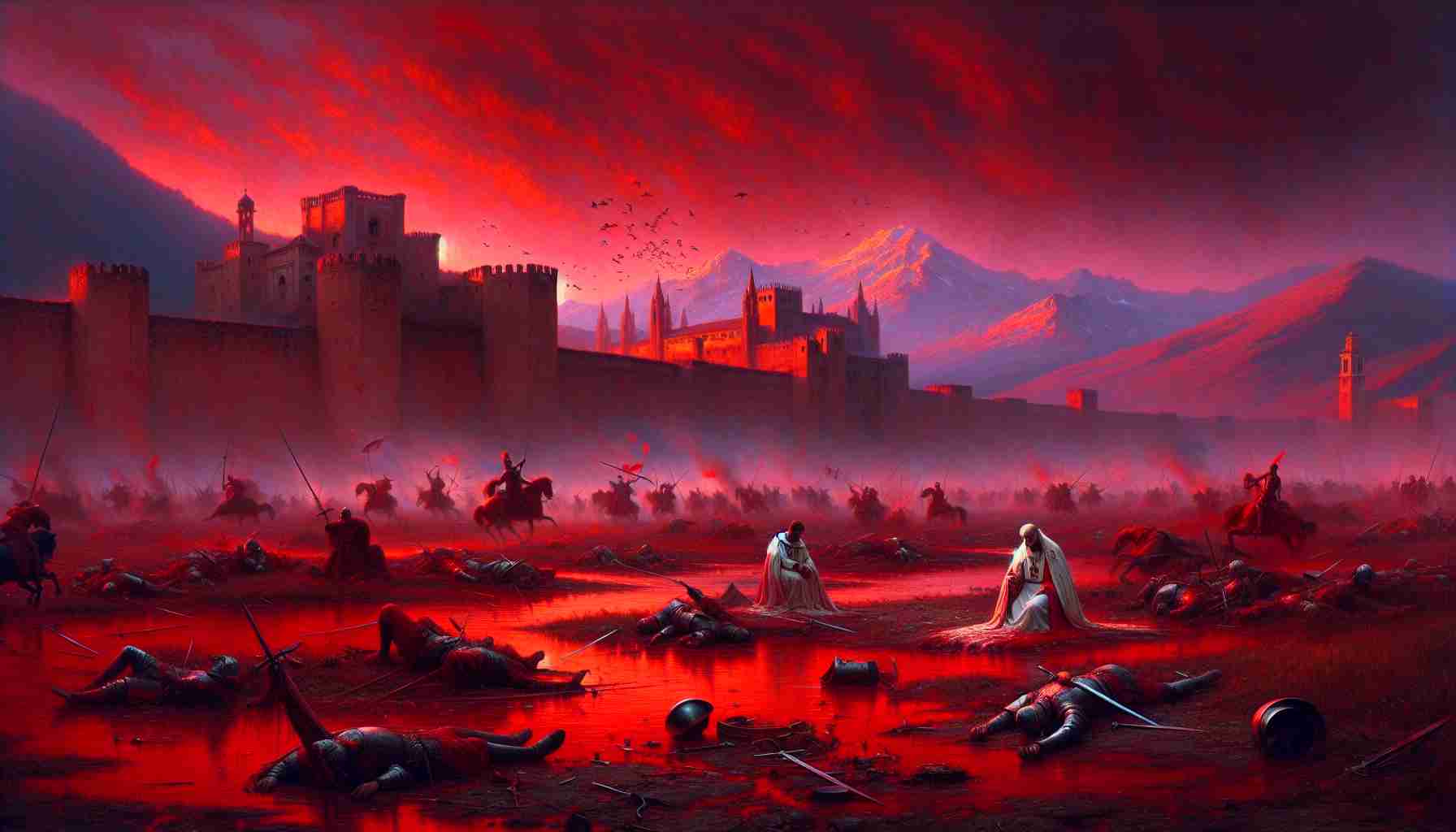

The bells had not rung that morning.
Instead, the sound was war—swords against shields, prayers swallowed by dust, and the guttural cries of men dying under the rising sun. The meadow near the Río Guadalete, once a quiet stretch of reeds and wildflowers, had become an altar of blood.
Bishop Orosius stood amidst the chaos, the hem of his white tunic streaked with mud and ash. There was no altar now, no pulpit, only trembling earth and the acrid sting of fire. Smoke curled above the battlefield like a serpent, obscuring the banners of the Visigothic king, Roderic, who even now clashed with the invading force led by Tariq ibn Ziyad. Roderic's golden crown glinted only briefly before vanishing behind the curtain of war.
A Christian kingdom fell today.
Orosius did not need a herald to announce it. He saw it in the arc of a sword that split a soldier's helm, in the corpses littering the field like broken branches. He heard it whispered from the lips of dying men, Psalm 23:4 breathed between gasps: “Yea, though I walk through the valley of the shadow of death, I will fear no evil…”
They feared no evil, yet death did not relent.
By nightfall, the fate of Visigothic Spain was sealed. The cross upon the king’s pavilion was torn down, replaced by the crescent. Some fled north into the mountains—but not Orosius. He remained. For his people, for the Word, for what could still be salvaged.
The city of Córdoba burned for days. Churches were emptied, their gold melted, their altars desecrated. But within the crumbling walls of what had once been the Basilica of San Vicente, Orosius and a handful of priests gathered in secret. They lit candles that cast shadows long and trembling across the broken stone.
“There is no longer a king to send armies,” said Father Ildemar, his face hollow with despair.
“There is still a Shepherd,” Orosius replied.
And so they endured—not with blades, but with steadfast prayer. The Muslim conquerors did not slaughter them. Instead, they taxed them, watched them. They became dhimmi—protected, yet separate. They were allowed to worship, so long as their faith stayed behind closed doors, soft as whispered incense.
Generations would call them Mozarabs, Christians living under Muslim dominion. They wore Arabic robes, spoke Arabic in the market, and chanted Latin hymns in the flickering half-dark of subterranean chapels. Their children learned to read both the Gospels and the Qur’an. Muezzins called the faithful to prayer above them, but in hushed sanctuaries beneath tiled courtyards, Psalms still rose like smoke through clay ceilings.
The Great Mosque of Córdoba rose in the years that followed—a jewel of arches and endless red-and-white stripes that soared like a wave through the prayer hall. But deep beneath its foundations lay the ancient bones of the Basilica of San Vicente, built long before Islam crossed the sea. Legend whispered that a single stone cross remained buried within the mosque’s shadow, untouched and unmoved.
When questioned, Muslim architects said the cross could not be removed—each attempt only cracked the foundation.
“Let it be,” they eventually said. “The building stands. Why disturb the stone?”
It was just a stubborn relic, perhaps. Or perhaps it was a covenant of endurance, carved in faith and weathered in silence.
Orosius did not live to see it. He died before the first minaret pierced the sky, buried in a garden shaded by olive trees. But his disciples carried his conviction forward.
In Toledo, Seville, and the mountain outposts, mozarabic rites flourished—unique liturgies infused with sorrow and resilience. Gregorian chants mingled with Andalusian melodies, making song out of sorrow, harmony out of exile. The Church bent, but it did not break. The Shepherd’s rod and staff still comforted them.
Centuries later, when Christian lords began to reclaim the North, tales of the mozarabs reached them—ghosts of faith in foreign lands. They wept to learn the Gospel had never fallen silent. Monks etched Orosius’s name into parchment beside those of martyrs.
They called it reconquista, but those who had never left called it remembrance.
The valley where the Visigoths fell now lies quiet. Wildflowers have returned, and reeds once again sway beside the river. Travelers pass through without knowing what blood once baptized those waters.
Yet some still pause, listening for something beyond wind.
If one waits long enough, on a silent morning, woven between larksong and breeze, a phrase may rise again from the field:
“Even though I walk through the valley of the shadow of death…”